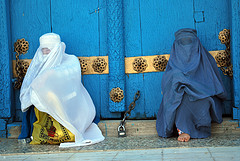- About
- Topics
- Picks
- Audio
- Story
- In-Depth
- Opinion
- News
- Donate
- Signup for our newsletterOur Editors' Best Picks.Send
Read, Debate: Engage.
In Afghanistan, 20 men took to the streets donning the ubiquitous blue burqa, made compulsory during the Taliban’s reign in the 1990’s. Their cause: to stand up for women’s rights in their homeland.
“One of the best ways to understand how women feel is to walk around and wear a burqa,”said a man from the Afghan Peace Volunteers who had organised the march.
A long robe covering the entire face and body with only a mesh window to see the world through, for many this garment became a symbol of the Taliban’s repression of women. Several of the men said wearing a burqa felt "like a prison". They carried signs reading: "equality," and "Don't tell women what to wear, you should cover your eyes".
If you were expecting the women to feel elated or thankful, you would be sorely disappointed. One 16-year old girl, covered in a black veil, said: “we don’t need anyone to defend our rights, this is just a foreign project to create a bad image for the burqa and Afghanistan. They’re trying to make those of us who cover our faces feel bad.”
One could forgive this 16 year old for knowing little about the freedoms that existed pre- Taliban. A 60-year old woman asked, exemplified another side to this acceptance. “My husband and son tell me I should take my burqa off, but I’m used to it, I’ve been wearing this for 35 years.”
Adaptation, of course, is an important factor in the human race’s survival. But how do we convince the adaptors that it is time to live more fully again?
As for the men, some stopped to watch, laughing and heckling. Some were confused; others said women's rights encouraged prostitution.
